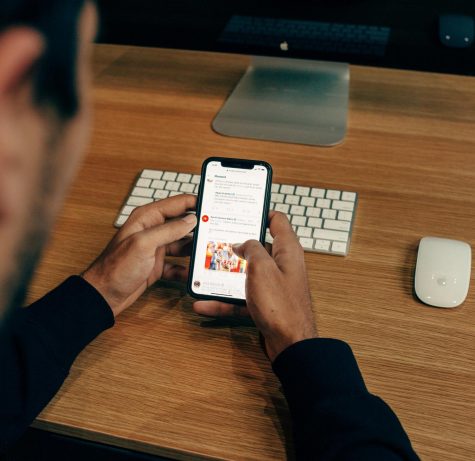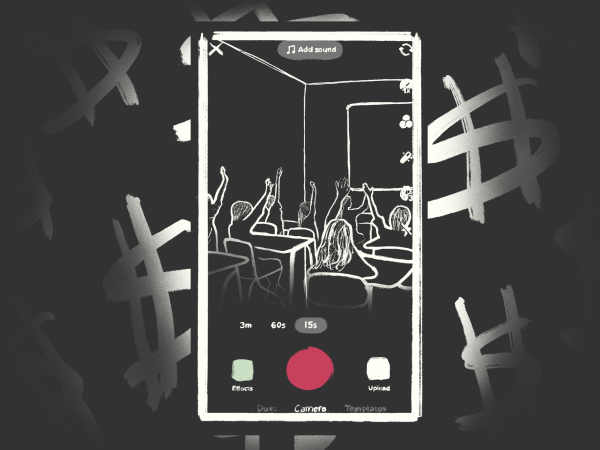OPINION: Cancel culture is toxic and does more harm than good
The phenomenon of “cancel culture” only creates an environment of hostility across various social media platforms. For those unfamiliar with the concept, it involves publicly calling out, shaming and boycotting celebrities and their products. However, its usage has stretched beyond celebrities and is now used to target the average citizen. As a result of cancel culture , ordinary people have faced consequences such as losing their jobs, being shunned by friends and family, or having to remove their online presence.
Cancel culture is believed to create a sense of accountability for those who say or do controversial things. Instead, it creates an environment where harassment and bullying are accepted and embraced. Social media gives anyone the opportunity to weigh in on the person being “canceled,” which not only jeopardizes that person’s safety, but also puts them at risk for being alienated completely. Unfortunately, that is sometimes the goal in these types of cancel culture situations.
A few days ago, I was scrolling through social media when I came across a reposted picture of a woman wearing a shirt that said the words “Drunk Wives Matter” in the style of a BLM (Black Lives Matter) shirt. Out of curiosity, I clicked on the original post to read the comments. In a matter of minutes, people on the platform had joined together to find this woman’s employer, her property owner, extended family and even the person who watches her dog. Several had already contacted her employer and her property owner in hopes of getting her fired from her job and out of her apartment.
While her decision to buy the shirt and post a photo of it was deplorable, those who were “canceling” her do not seem to understand it that only creates a sense of resentment. In a country where repairs to relations are already crucial, it seems unnecessary to cause extra harm. It is not creating a sense of accountability for her actions; it is simply harassment. Those who took part in “canceling” her felt a sense of power and purpose in doing so, but the action did not address any of the institutional issues that come along with it. There is a reason this woman decided to buy the shirt and then post it for everyone to see. It does not make her a white supremacist; it makes her an incredibly ignorant and uneducated person. Chances are, she does not understand why. “Canceling” her is the opposite of the educational culture that we must instead create.

When someone is experiencing hate, especially over social media, their first instinct is to defend oneself and justify their actions. They are not going to be open to hearing what others say and instead are put on the defense, seeing every comment as a threat. If this woman genuinely believes that she did nothing wrong, she is either going to stay silent or seek affirmation from others who also believe that her actions were not wrong. She is going to disregard the commentators as “haters” or those who are just overly sensitive to a shirt that she thought was funny. The next day, there will be someone else being canceled, as this is a temporary situation for her.
The constant instances of cancel culture solve nothing. There are greater issues beyond this single woman buying a shirt. The shirts are openly mocking Black Americans struggle for justice in this country. Someone decided to create and market these shirts to the public, and a quick Google search confirms just how many retailers have hopped on the trend. These retailers only believe that their product is marketable due to the Fox News personalities and members of Congress who reinforce the belief that BLM is not something to take seriously, but to mock.
This country is dealing with not just deeply rooted white supremacy, but the certain phrases such as “white privilege” and “Black Lives Matter” trigger those who do not understand the foundation of those phrases. As I mentioned before, the first reaction is often justification or deflection, which is why we hear “I don’t have privilege” and “All Lives Matter” in response. There is a conspicuously obvious educational gap when it comes to the coverage of American History. Non-people of color have a moral duty to understand why systemic racism exists and persists in this country.
Cancel Culture must become educational culture. Former President Obama weighed in on cancel culture, saying “That is not activism,” to those who take part in the public harassment and shaming of others. I include his quote not because he was the first Black president, but because he spent years in his early twenties supporting and working on grassroot campaigns. As a young person who also takes part in grassroots activism, it is deeply troubling to hear cancel culture being expressed as activism.
Instead of taking part in the hateful rhetoric, I urge others to instead concentrate their efforts into voter’s rights organizations, civil rights organizations, LGBTQIA+ organizations, or wherever their passion drives them. There are too many who face lawful discrimination to this day, and the focus should be on extending equal rights to all Americans. Racism and ignorance do not deserve a platform and cancel culture does just that. Instead, we need use those same platforms to amplify the voices who are pushing for positive change, rather than allowing others to pull us decades back.












Jim Hayes • Apr 3, 2023 at 10:57 pm
I really enjoyed the reading until I reached the 7th Paragraph and after. Not only does this ruin the purpose of the neutrality of the argument, but really exposes that the article’s purpose is not to deflect cancel culture. Agreeably, the deflection of cancel culture is not to concede to the other side by “taking efforts into voter’s rights organizations” which are rather controversial in the twenty-first century. Rather, there is really no solution to cancel culture unless we have civil conversations with one another, instead of jumping to conclusions. We should continue to talk to each other instead of trying to find one-sided solutions and thinking it is a one-size fits all.
Grey • Sep 2, 2021 at 6:04 pm
The way I see cancel culture used the most is to socially execute someone. Destroy their life whether their guilty or not, or their “crime” is large or small. It’s a step up from the toxic comments of “Go kill yourself racist trash!” To “we will just kill yourself for you.” And sometimes they succeed and drive the victim to suicide, and celebrate. That’s all you need to see to recognize many SJW’s are sociopaths.
I also don’t see any differentiation between levels of social “crimes.” Wearing a drunk wives matter t-shirt, admitting you’ve said the n-word in your life, or blowing up a black church: It’s all the same 10/10 hate-filled reaction. SJWs want to bully people into conforming to their beliefs, or you’ll be sorry.
I’m an American and I support freedom of speech and beliefs. You have every right to believe what you want. I’m gay, and I don’t like to be actively harassed in public. It’s rude and cruel for others to inflict their beliefs on me without my consent. Do I want to attack someone for not approving of gays personally, but do not act of those beliefs? No. They have their right to believe whatever they chose, right or wrong, it’s not my business if they are keeping their beliefs private. I don’t care what you believe, so don’t care what I believe. Now when politicians or people advocate for banning gay marriage, Sodomy laws, etc., then that is inflicting their beliefs on me and I’ll fight to defend my rights.
Cancel culture is a social support movement for women’s rights, black rights, trans rights, etc. Small people have big power now to attempt to force immediate social change, which before would take decades to do. I’m all for social change and making the world a more fair place because there are many problems.
The worst offense cancel culture has is being led by emotions. People become a hive mind of anger and want retribution. They misplace all of their and societies problems onto the offender. Rational and pragmatic thinking? Forget about it. “That scum of the earth didn’t put his fist up to support black lives matter/women’s rights/anti-abortion, kill him!” It’s one of the worst traits of groups of humans, and it may never go away. It is ALWAYS better to think rationally and pragmatically about why you are angry, who is this offender, what is the evidence, what can we do to make things better, etc…
Think before you act. And most importantly, think for yourself. Don’t be a blind follower.
Michael Murphy • Apr 25, 2021 at 7:47 pm
Ms. Horowitz had me until 7th paragraph. “All lives matter” is not simply a deflection, but a deep belief many people from all different racial and ethnic backgrounds have. It is LESS racist to say “all lives matter” than “black lives matter.” Additionally, the BLM movement or organization really is an anti-American crusade rather than for the benefit of black Americans. And racism is not systemic in our country although it certainly does exist to an extent in all groups. If racism is still systemic, there would be no black police officers or members of congress, for example.
But I do agree with Ms. Horowitz that Cancel Culture is indeed harmful in our society and needs to be eradicated. No one should lose their job or property for merely saying “all lives matter.”
Matt • Mar 7, 2021 at 1:52 pm
I think in a time when people expect honesty and integrity, for people to get along and weed out bullying the people who are so easily offended are embracing exactly the opposite. Its not enough to simply call out somebody who the offender but to destroy their reputation and in some respects their lives. People do this using social media platforms as weapons. Some cancel culture is ok but there are always those who will push the boundries. The victims of cancel culture have little to no recourse. The people in support of their cancelling have promoted bullying and the failure to accept accountability. The exact opposite of what they desire if only to ignore their own social insecurities. People need thicker skin before they create a future generation of thin skinned children that will not possess the mental faculties to deal with issues that are universally offensive vs their expectations of how the people around them are supposed to behave. They won’t be happy until everything in life is censored and all those freedoms and liberties are swallowed up in policies and policing. Grand standing for socialism.